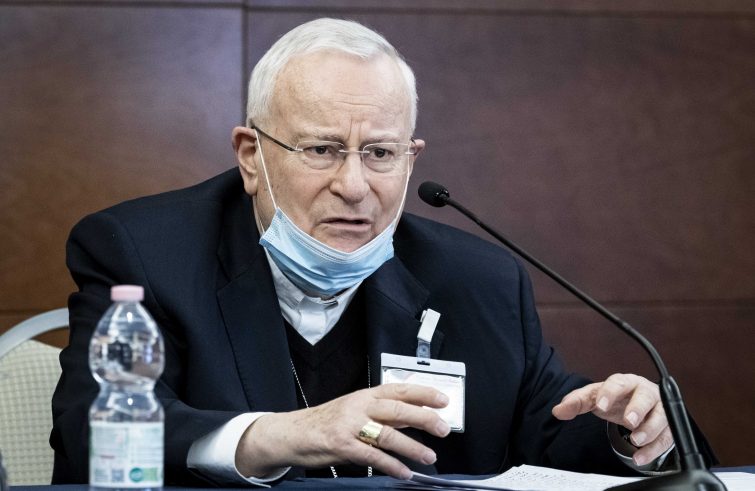
“We look forward to a rewording of the draft bill”, said Card. Gualtiero Bassetti, Archbishop of Perugia-Città della Pieve and President of the Italian Bishops’ Conference (CEI), on the subject of the Zan draft law, due to be voted on by Senate on July 13. “Welcoming, open and non-prejudicial dialogue” is the Italian bishops’ stance, in full harmony with the Holy See and with the Magisterium of Pope Francis.
“The Note Verbale and the Congregation for the Doctrine of the Faith Document under no circumstances suggest non-acceptance of homosexual persons”,“The Congregation responds in the negative to the possibility of imparting a blessing to couples living out of wedlock, including opposite-sex couples. The Catechism of the Catholic Church is equally explicit: people with homosexual tendencies must be accepted with ‘respect, compassion, and sensitivity’, avoiding ‘every sign of unjust discrimination’ (cf. no. 2358). Moreover, in the notes released by the presidency of the Italian Episcopal Conference in June 2020 and last April, we reaffirmed the need and the willingness to accept and accompany homosexual persons.” His Eminence said he deplores the tendency to “seek groundless confrontation”: “The Pope, the bishops, the priests, the Christian communities, all regard homosexual people through the eyes of Christ and extend their embrace in merciful zeal.”
“No one, including the Holy See, has ever questioned the secularity of the State.
The term ‘interference’ is wrong, as is ‘undue’, the Cardinal argues, quoting the words of Cardinal Parolin: “the Holy See’s Note Verbale refers to potential interpretations of the text, with consequences that can prove to be paradoxical.”
“In the absence of clarification, within the ordinary course of the inherent evangelizing mission of the Church in Italy, part of the universal Church, there is a risk of arbitrarily making anthropologically empirical assertions – based, inter alia, on the faith shared by millions of believers – liable to prosecution”,
said the President of Italian Bishops, with the reminder that “the exchange of Notes Verbale is a diplomatic procedure. In a subtle fashion, the Holy See brought attention to certain aspects. The gist of the question is: how come a confidential document was submitted to the press for publication?” In other words, the Italian Bishops’ Conference and the Holy See have “different profiles that complement each other in every way: one initiative does not exclude the other”, as Cardinal Parolin said, “there is full continuity of views and actions” between the Holy See and the Italian bishops on the issue: “any other assumption is ungrounded.” “The Italian Bishops’ Conference publicly voiced its concerns over the draft text a year ago, and they were extensive, such as the lack of clarity in the legislative text or the inherent threat posed by crimes of opinion,” Cardinal Bassetti pointed out. “These concerns have also been extensively expressed by associations, movements, intellectuals and politicians from across the political spectrum. The Holy See’s statement, expressed confidentially, is different both in terms of modality and of content.” As for the alleged “pressure from the Italian bishops” for more assertive action, the Cardinal remarked: “These are biased and artfully fabricated narratives designed to stir controversy.
No such thing as an internal crisis in the Vatican has occurred, let alone between the Holy See and the Italian Bishops’ Conference. Quite the contrary: it is self-evident that the Holy See and the Italian bishops share the same views on this bill.
Both institutions have expressed their views on the matter in their own way.
Regarding a National Day against Homophobia in Schools, Bassetti stated:
“Freedom of expression must be properly guaranteed and, especially in cases where penal regulations are to be adopted, there must be no scope for unreasonable interpretations. If not, the risk is that, in addition to incitement to hatred, freedom of expression of moral and religious beliefs will be subject to prosecution, and the universal human right of parents to educate their children according to their own conviction and to teach them right from wrong will be called into question.” “Our perplexities”, pointed out the President of the Italian Bishops’ Conference, “have been expressed by many people from different backgrounds this year, as some of the terms appear extremely vague, making the enforcement of this penal law dangerously unpredictable.”
“As distinguished jurists have pointed out,” the CEI President continued, “the different roles of men and women within Catholic organizations or the affirmation of certain religious principles could be the object of criminal proceedings because some individuals deem them susceptible to causing specific acts of discrimination.” Answering a question regarding the alleged inclination of “some Italian bishops” to show “nostalgia for a more assertive Bishops’ Conference on ethically sensitive issues”, Cardinal Bassetti replied:
“Sometimes I have the impression, and I am not the only one, that there is a tendency to relate to a bygone past with a nostalgia that fuels diversion from the present times,
“Instead, we must strive to ensure that our voice, the voice of all Christians, is distinctly heard in today’s society”, remarked the CEI President: “Christianity embodies universal human values that should be put to the service of the common good in an ever greater way. In this respect, I firmly believe that Catholic laity has an extraordinary contribution to make in this particular period. We must rediscover and be able to bear ever greater witness to the beauty of participating in a shared vision of life”. In this context, Bassetti observed, “the synodal path initiated with the May General Assembly of the Italian Bishops’ Conference can yield significant results”.










